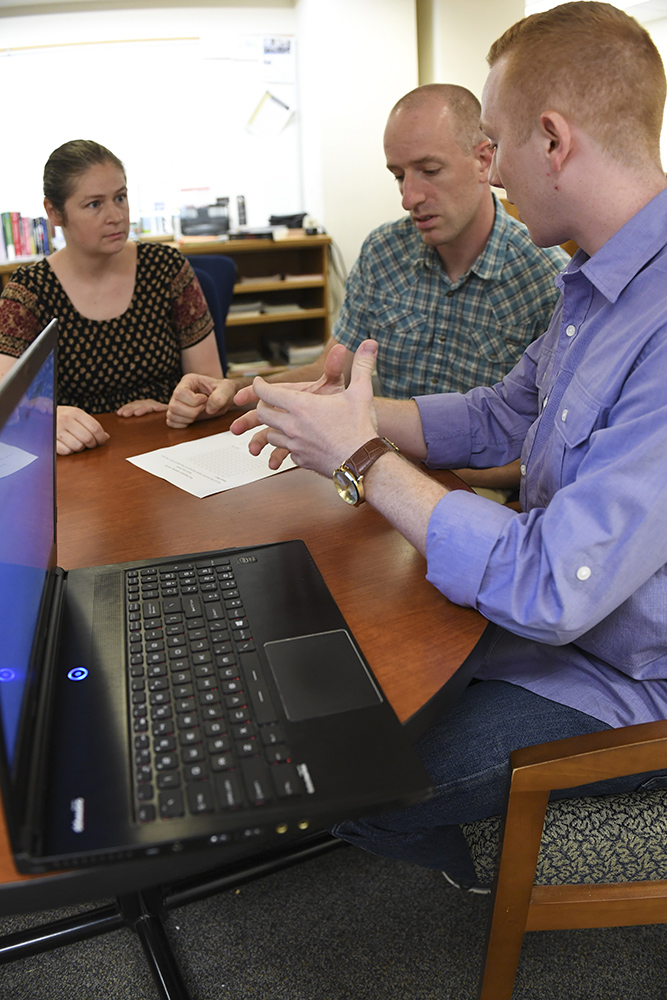Teach the Math They Need
 |
| Ross Schmeisser ’18 (right) talks math with Lt. Col. Paul Moosman and Maj. Jessica Libertini. – VMI Photo by Stephen Hanes. |
LEXINGTON, Va., Aug. 29, 2016 -- It’s not every day that college students are asked to come around to the other side of the desk and think like professors. Nor is it every day that college students are asked to undertake a massively interdepartmental project. But that’s exactly what happened this summer in VMI’s Department of Applied Mathematics, as two cadets worked under the auspices of the Summer Undergraduate Research Institute to develop content for the Institute’s quality enhancement plan.
Ross Schmeisser ’18, a mechanical engineering major, spent the first summer session talking to faculty in the departments of biology and economics and business about what math skills they’d like their majors to have, while Chen Chun-Hao ’18, an applied math major, likewise met with faculty in these departments and international studies and political science during the second summer session.
Input from both cadets will be used as Maj. Jessica Libertini and Maj. Karen Bliss, both assistant professors of applied mathematics, write the quality enhancement plan, a requirement for VMI’s bid for reaccreditation from the Southern Association of Colleges and Schools Commission on Colleges.
The quality enhancement plan strives to change how cadets whose major fields do not require calculus learn math – and both Libertini and Bliss expressed frustration at a higher education system that frequently requires students to take a math class, but does not make that math applicable to the careers those students will be undertaking. The required math class “is just a check in the box, and not something anyone thinks they could gain anything from,” said Bliss. “It almost seems like an act of futility to teach such a class.”
Following the Institute’s selection of a math and problem-solving-targeted QEP, it was natural to turn to the in-house expertise of Libertini and Bliss, as both faculty members have earned national recognition in the fields of mathematical modeling and applied mathematics education. Math modeling teaches a problem-solving framework in which students translate the real world into a mathematical problem, solve the problem, and then communicate the solution to an interested audience.
Because of this emphasis on mathematical modeling, carefully designed modules that open with intriguing interdisciplinary questions and help students develop a broad set of skills will be the central focus of a new two-course sequence for 4th Class cadets whose majors do not require calculus. The new sequence, which is tentatively scheduled for implementation in the 2018-19 academic year, will replace two current course sequences in the applied math department: Math 105/106, Introduction to Probability and Statistics, and Math 125/126, Quantitative Methods.
Cadets taking these classes to fulfill the math requirements in a variety of disciplines, including biology, history, and economics and business.
“We want this course to serve the other departments so I want them to feel represented in this course,” Libertini said. Consequently, Schmeisser and Chun-Hao spent much time with faculty in those other departments, seeking to learn as much as they can about what quantitative skills their majors need. Their research will help Libertini and Bliss as they design the new course sequence to include modules covering the quantitative skills needed by all of those departments.
In an email interview, Schmeisser explained that he’d begun his work in the biology department by sitting down with Lt. Col. Paul Moosman '98, associate professor of biology, to learn more about the statistical analysis of Moosman’s research on the Eastern small-footed bat. Specifically, Moosman needed to come up with a way to estimate the entire population of the species without attempting to count every single bat.
“Maj. Libertini, [Maj.] Bliss, and myself decided we would write a module around [the idea that] the world isn't perfect and using the concept … to teach the concept of sample taking,” Schmeisser wrote. “The biology department needs students who have very strong grasp [of] probability and statistics skills and a firm foundation [in] calculus.”
In the Department of Economics and Business, Schmeisser met with Lt. Col. Sam Allen and Lt. Col. Valentina Dimitrova-Grajzl, both associate professors, to learn about the quantitative skills economists use. He found out that economics is a math-heavy discipline, and economists need math skills to predict a country’s economic development.
“We plan to use the data given to us by the ECBU department to start a conversation about correlation vs. causation (a constant problem in any data analysis),” Schmeisser wrote. “What actually causes the change?”
He concluded, “The ECBU students need to enter into their major classes confident in their math skills and need to be able to apply those numbers to mean something in the real world.”
That’s just what Schmeisser – and his faculty mentors – hope and expect to see in the years ahead, once the new course sequence is implemented.
“This new math class has been created in order to make math seem less like a chore and make it interesting and applicable,” Schmeisser wrote. “I personally believe that this class will boost students’ confidence in math, and they will find that math will actually follow them into whatever career they choose.”
For Libertini and Bliss, applicability is likewise at the heart of the quality enhancement plan. Libertini noted that when she’s designing a course, she always asks herself what she expects students to remember in five years – or 20 years.
“No matter how many times I ask them to repeat the quadratic formula, I don’t expect them to remember it in five years if they aren’t using it,” she said. “Wouldn’t it be much more valuable if I could equip them with the confidence to learn more quantitative skills as needed?”
– Mary Price
-VMI-
.svg)
.png)